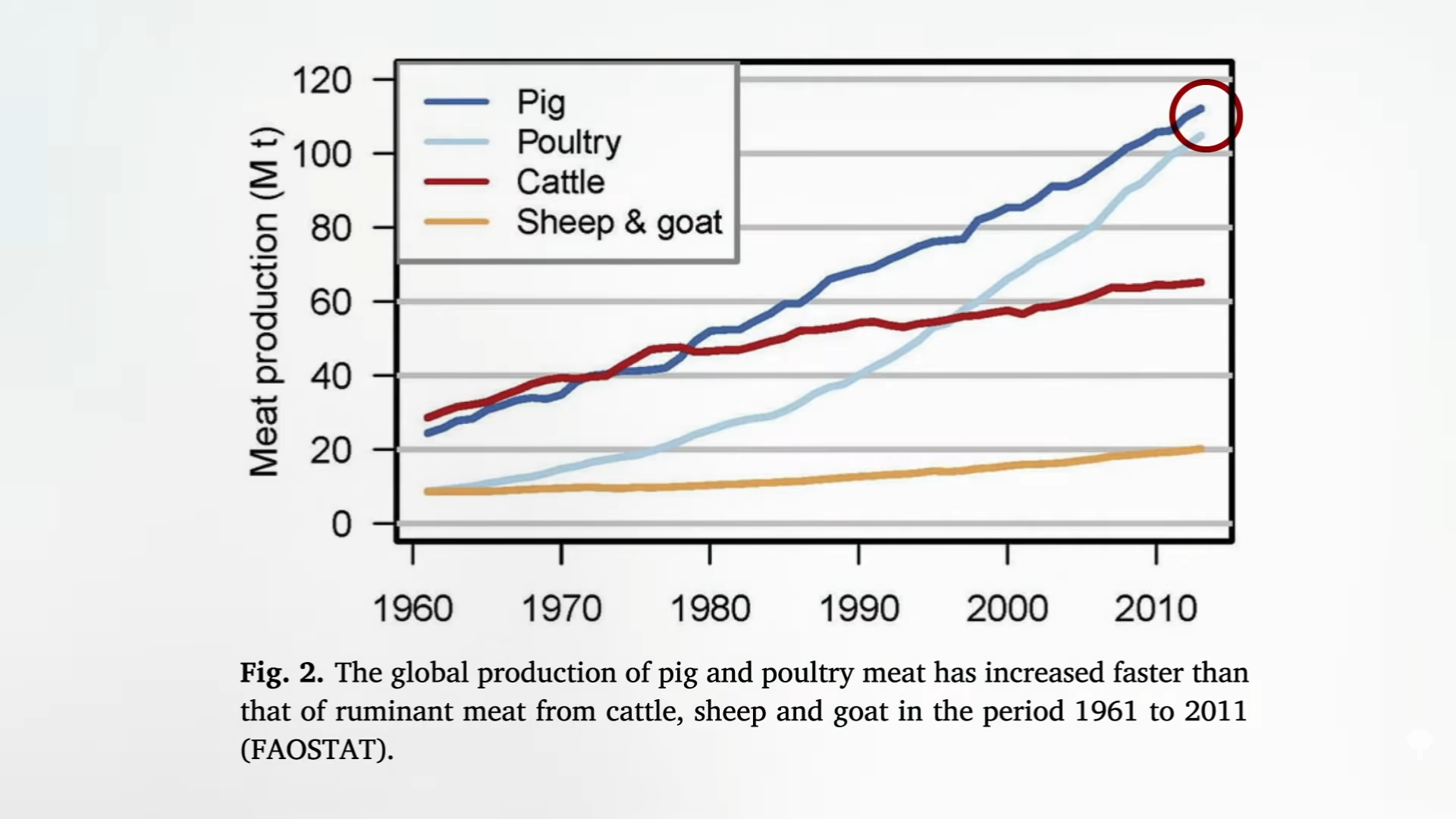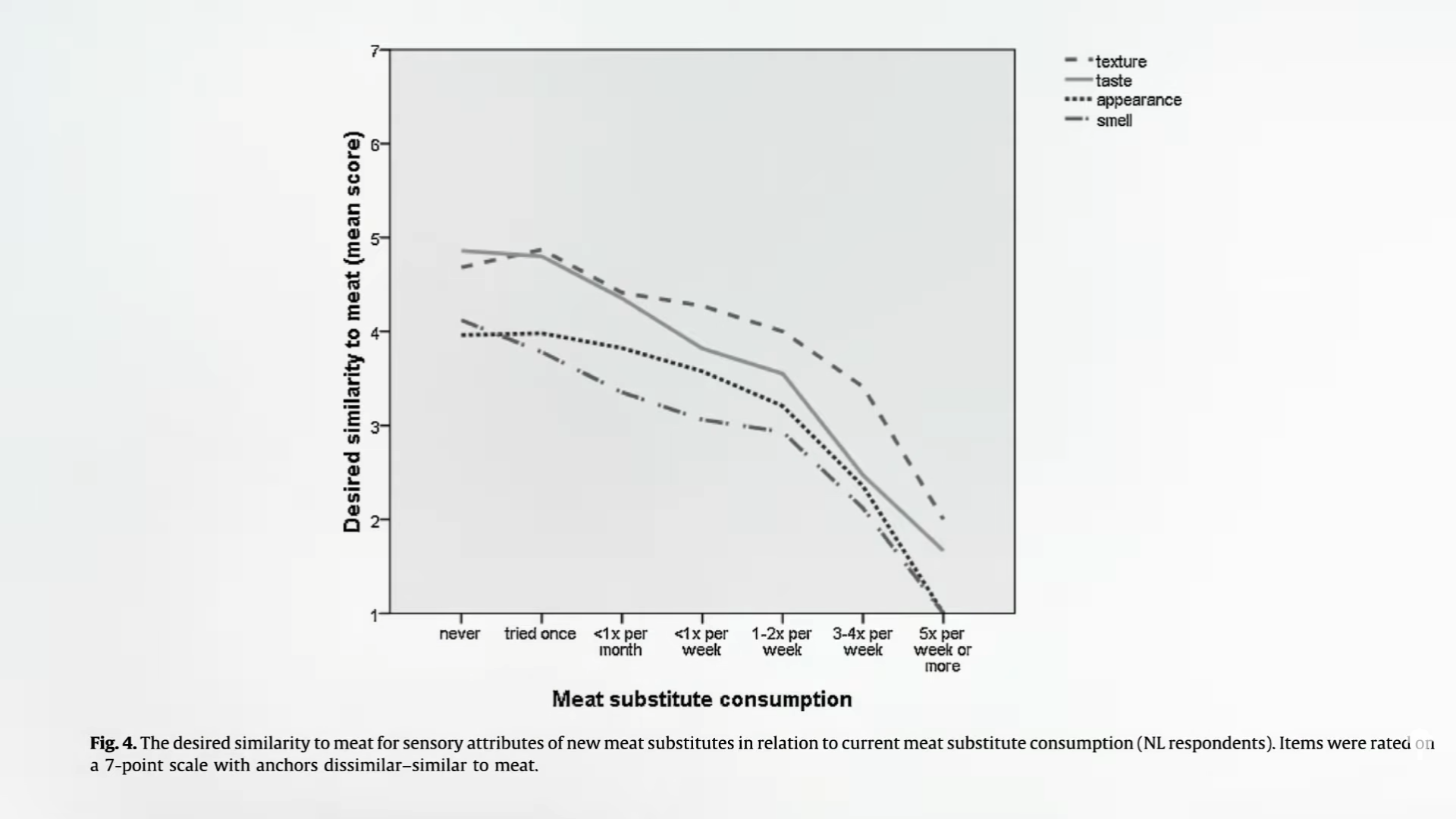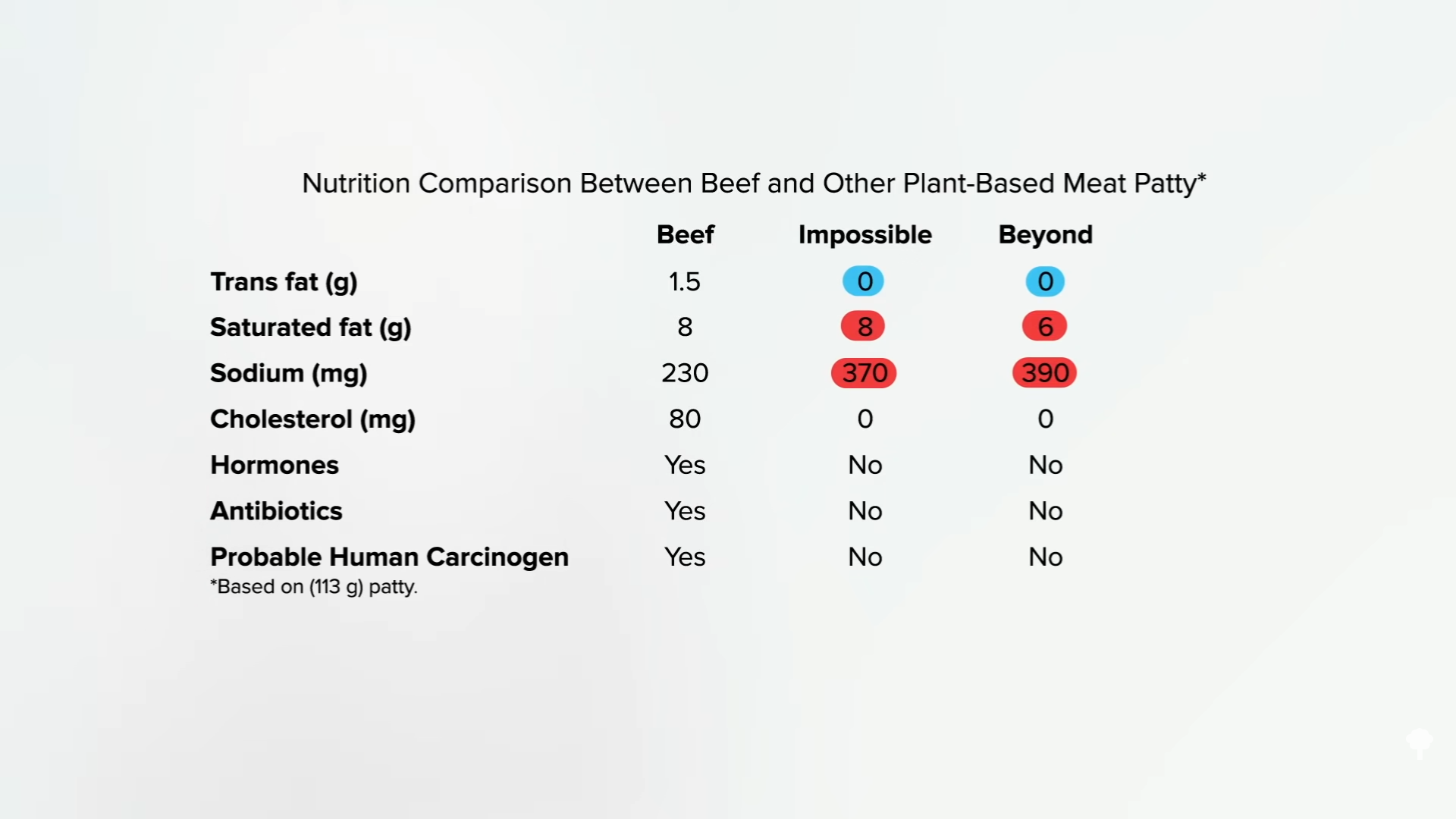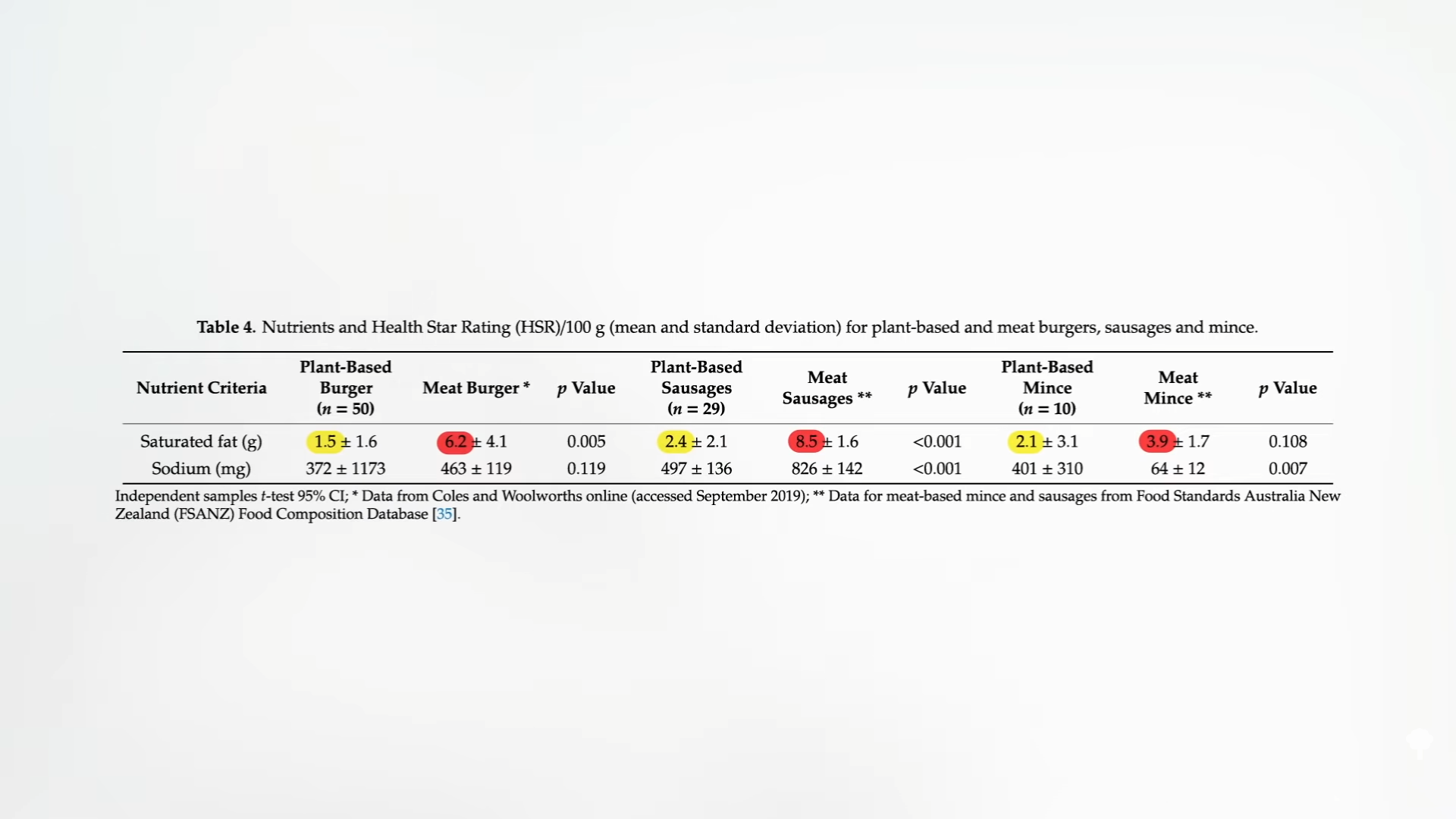What happens when you compare the trans fats, saturated fat, sodium, and cholesterol levels in plant-based meats versus animal-based burgers?
Global meat production has skyrocketed over the last half-century. As you can see below and at 0:20 in my video Are Beyond Meat and the Impossible Burger Healthy?, pork and poultry meat now exceed 100 megatons—that’s 100 million tons—a year, and “our growing demand for meat and dairy food products is unsustainable.”

“Anti-consumption and/or reduction of meat and animal by-products are arguably the most impactful ways in which consumers can alter their diets to positively impact individual and societal well-being.” Interest in plant-based diets and meat reduction is definitely growing, but even something like Meatless Mondays “requires dietary change and neither sustainability nor health approaches are likely to work with those who have strong positive beliefs about meat eating.” However, swapping in plant-based meat alternatives “may help disrupt the negativity around reducing meat.” For hardcore meat eaters, though, the substitutes have to taste like meat and look like meat.
It’s interesting. The more people consume meat substitutes, the less likely they are to care that they have similar tastes, textures, appearances, or smells of meat, as you can see here and at 1:04 in my video.

But for plant-based alternatives to appeal to those who need them, the meatier, the better. This has certainly been accomplished with the spate of new plant-based products on the market, and study after study after study agree that they’re healthier for the planet. Are they healthier for us, too?
As you can see below and at 1:30 in my video, when the labels of beef, Impossible, and Beyond burgers were compared and four of the worst components of the food supply—trans fats, saturated fat, sodium, and cholesterol—were assessed, the plant-based burgers won hands down when it came to trans fat and cholesterol. We all know that trans fats are “a serious risk factor to cardiovascular disease, cancer, and diabetes,” but they’ve also been associated with symptoms of depression, a lowering of testosterone in men (even at just 1 percent of calories), as well as linked to “a greater risk of developing all-cause dementia and Alzheimer disease.” Indeed, higher levels of trans fat in our blood are associated with up to a 50 percent higher risk of developing dementia, including Alzheimer’s.

Now that partially hydrogenated oils have been phased out of the food supply in the United States, for example, the only major source of trans fats that remains will be animal products.
What is the tolerable upper daily intake level for trans fat? An upper limit was not set for trans fat by the Institute of Medicine (IOM) “because any incremental increase in trans fatty acid intake increases CHD risk,” and coronary heart disease is the number one killer of men and women. That is, any intake of trans fat above zero “increases LDL cholesterol.”
Because trans fatty acids are unavoidable in diets that contain meat and dairy, consuming zero trans fat “would require significant changes in patterns of dietary intake.” One of the authors of the Institute of Medicine’s report is from the Harvard School of Public Health’s nutrition department and offered a memorable explanation for why the IOM panel did not cap it at zero: “‘We can’t tell people to stop eating all meat and all dairy products,’ he said. ‘Well, we could tell people to become vegetarians,’ he added. ‘If we were truly basing this only on science we would, but it is a bit extreme.’” (We wouldn’t want scientists to base anything on science…)
Anyway, plant-based meats being trans-fat-free is a big advantage, and, of course, they’re free of cholesterol, hormones, and antibiotics, and have not been designated as “probable human carcinogens” by the World Health Organization, as you can see here and at 3:30 in my video.

Now, I’m not happy with the plant-based burgers’ added salt, which is about a quarter of the American Heart Association’s 1,500-mg daily upper sodium limit, or their saturated fat (from added coconut oil), but those do seem to be outliers. In the largest study of the nutritional value of plant-based meats to date, saturated fat levels of similar products only average about 2 grams per serving, which is much better than the animal-based equivalents. Sodium remains a problem throughout the sector, though, like nearly any other processed food out there, as seen here and at 4:03 in my video.

How processed are these products? Let’s look at the fiber content, for example. Seeing any fiber in a burger is a good thing, but if we ate the same amount of protein from yellow peas, for example, the primary plant protein in Beyond Burger, there would be almost no saturated fat or sodium at all, and we’d get a full 20 grams of fiber, as seen here and at 4:25 in my video.

Processing plants in a processing plant can eliminate 90 percent of the fiber, but processing plants through animals eliminate 100 percent of the fiber.
As the chair of Harvard’s nutrition department put it, “Nutrition policies and dietary guidelines should continue to emphasize a diet rich in plant-based foods such as nuts, seeds, and legumes or pulses, which are rich in protein and many other nutrients but require little industrial processing.” But we shouldn’t let the perfect be the enemy of the good. Not everyone can go all kale and quinoa overnight. The choice on a U.S. Burger King menu isn’t between a beef Whopper and soybeans (a primary ingredient in the Impossible patty), but between a beef Whopper and an Impossible Whopper, and in that case, it’s a no-brainer.
If you missed the first video in this series on plant-based meats, see The Environmental Impacts of Plant-Based Meat Substitutes.
Stay tuned and check more videos in the related posts below.
For a healthful, whole-food veggie burger, check out my recipe for Black Bean Burgers from my first cookbook.






